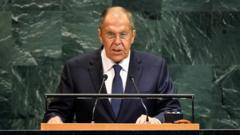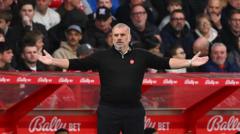Is Russia Really Planning to Attack EU or NATO States?

Published: 2025-09-27 18:25:16 | Category: world
In a recent address at the UN General Assembly, Russian Foreign Minister Sergei Lavrov stated that Russia has no plans to attack NATO or EU member states. However, he issued a stark warning of a "decisive response" to any perceived aggression against Moscow. Lavrov's speech also critiqued Western nations and addressed the ongoing conflict in the Middle East, particularly the situation involving Israel and Palestine.
Last updated: 26 October 2023 (BST)
Key Takeaways from Lavrov's Speech
- Russia does not intend to attack NATO or EU countries but will respond decisively to any aggression.
- Lavrov condemned Israeli actions in Gaza while also criticising Western nations for their role in the conflict.
- Accusations against Russia regarding airspace violations and drone incursions were addressed, asserting Moscow's innocence.
- There were criticisms of the US administration's approach to the Ukrainian crisis and diplomatic relations.
- Recognition of a Palestinian state by some Western nations has been questioned by Lavrov regarding its timing and intent.
Russia's Stance on NATO and EU Threats
During his address, Lavrov highlighted a growing trend of threats against Russia from Western nations, especially concerning its relationships with NATO and the European Union. “Threats of force against Russia, accused of practically planning an attack on the North Atlantic Alliance and the European Union, are becoming increasingly common,” he stated. This assertion reflects Russia's ongoing concerns about NATO's eastward expansion and military posturing along its borders.
Lavrov emphasised that despite these threats, Russia has no intentions of initiating conflict. President Vladimir Putin has repeatedly dismissed claims of Russian aggression towards NATO as provocations. However, Lavrov made it clear that any aggression towards Russia would elicit a strong response, reinforcing Moscow's commitment to national security.
Criticism of Israeli Actions in Gaza
In a significant portion of his speech, Lavrov condemned the actions of Israel following the Hamas attacks on 7 October 2023. While he condemned the initial attacks by Hamas, he voiced that there was "no justification" for the ongoing violence against Palestinians in Gaza. The toll has been staggering, with reports from the Hamas-run health ministry indicating that over 65,000 people have died due to Israeli airstrikes.
Lavrov also expressed concerns about Israel's broader regional actions, stating that aggression towards neighbouring countries could "blow up" the Middle East. His remarks reflect growing tensions in the region and the complexities surrounding international responses to the Israeli-Palestinian conflict.
Concerns Over Iran and Sanctions
Lavrov's speech also touched upon the situation involving Iran. He accused Western powers of sabotaging diplomatic efforts aimed at delaying the reimposition of sanctions against Tehran. Following a failed last-minute bid led by Russia and China, new sanctions are set to come into effect, which Lavrov described as "illegal". This tension underlines the fragile state of diplomatic relations and the potential implications for regional stability.
Responses to Accusations Against Russia
Moscow has faced accusations concerning airspace violations and drone activity in recent weeks. Denmark reported drone sightings over its airports but did not attribute the incidents to Russia, describing the actions as potentially from a "professional actor." Meanwhile, Estonia accused Russia of violating its airspace with military aircraft. Lavrov reiterated that Russia denies any involvement in these incidents, suggesting that the allegations are part of a larger narrative aimed at discrediting the nation.
The Role of NATO and US Relations
In his address, Lavrov also addressed the evolving nature of US-Russian relations, noting a shift in the current US administration's approach. He suggested that there is a desire for pragmatic cooperation, particularly in resolving the ongoing crisis in Ukraine. This statement indicates a potential opening for dialogue, although the complexities of the situation remain significant.
Furthermore, former US President Donald Trump's recent comments, advocating for NATO nations to shoot down Russian planes in their airspace, highlight the heightened tensions and the precarious nature of international relationships.
Recognition of a Palestinian State
Finally, Lavrov questioned the motivations behind the recent recognition of a Palestinian state by certain Western countries, including the UK and France. He implied that this recognition was belated, suggesting that it came at a time when the situation in Palestine had deteriorated significantly. This criticism reflects a broader frustration with the perceived inaction of Western nations in addressing the Palestinian cause.
Looking Ahead: What’s Next for Russia and the West?
As tensions between Russia and the Western powers continue to escalate, the international community remains watchful. The implications of Lavrov's statements extend beyond mere rhetoric; they highlight a critical juncture in global diplomacy. The potential for conflict remains, particularly if perceived aggression is met with retaliatory actions. Observers are left questioning what steps may be taken next and how these developments will shape the geopolitical landscape in the coming months.
FAQs
What did Sergei Lavrov say about NATO and EU threats?
Sergei Lavrov stated that Russia has no intentions of attacking NATO or EU member states but will respond decisively to any aggression directed towards Russia.
How did Lavrov address the conflict in Gaza?
Lavrov condemned Israeli actions in Gaza, stating there is no justification for the brutal killings of Palestinians, while also criticising Hamas's initial attacks on Israel.
What accusations has Russia faced regarding airspace violations?
Russia has been accused by Denmark and Estonia of airspace violations and drone incursions, which Lavrov has denied, asserting that these allegations are unfounded.
What is Lavrov’s stance on US relations?
Lavrov suggested that the current US administration shows a desire for pragmatic cooperation to resolve the Ukrainian crisis, indicating a possible shift in US-Russian relations.
Why did Lavrov question the timing of Palestinian state recognition?
Lavrov questioned the timing of the recognition by Western countries, suggesting it was delayed until the situation in Palestine had worsened significantly.
As the geopolitical landscape evolves, the actions of both Russia and Western nations will be pivotal. This ongoing tension is not just a matter of rhetoric; it shapes the future of global relations and regional stability. #Russia #NATO #MiddleEast



